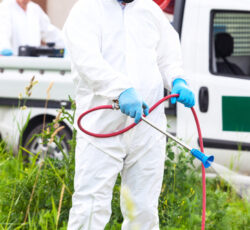 The Importance of Conducting Flea and Tick Control During Landscaping Maintenance
The Importance of Conducting Flea and Tick Control During Landscaping Maintenance
During the warmer months, many homeowners focus on maintaining their lawns and outdoor spaces to enjoy the beautiful weather. However, landscaping maintenance should not only focus on aesthetics but also on the health of your pets and family. Fleas and ticks are common pests that can infest your lawn and are not only a nuisance but can also cause diseases. As such, conducting flea and tick control during landscaping maintenance is essential. In this blog post, we will explore the importance of flea and tick control and how it can be incorporated into your landscaping maintenance routine.
Fleas and ticks: common pests
Fleas and ticks are small, blood-sucking parasites that can cause significant problems for pets and humans. Fleas are often brought into your home by pets or from outdoor environments, like in lawns, fields, or parks. These pests can quickly multiply and infest your home, living in carpets, bedding, and furniture, causing itching and irritating bites.
Ticks are typically outdoor pests, often found in wooded areas. They attach to pets or humans to feed on blood and can transmit diseases, such as Lyme disease, Rocky Mountain spotted fever, and tick paralysis. In addition to these diseases, ticks can cause significant discomfort and be challenging to remove.
Importance of flea and tick control
Controlling fleas and ticks in your lawn is essential for several reasons:
1. Prevent the spread of diseases
Both fleas and ticks can carry harmful diseases that can be transmitted to humans and pets. Ticks, in particular, are known for causing Lyme disease, which can result in long-term health problems if left untreated. By conducting flea and tick control, you can reduce the risk of disease transmission.
2. Protect your pets
Fleas and ticks can cause significant discomfort for pets, leading to itching, scratching, and skin irritation. In severe cases, these pests can cause anemia, weight loss, and even death. Protecting your pets from fleas and ticks is essential for their overall health and wellbeing.
3. Preserve the environment
Flea and tick control that utilizes chemicals can have negative impacts on the environment. Using natural flea and tick control methods can help to preserve the environment and reduce the negative effects of chemical pesticides on beneficial insects and animals.
Incorporating flea and tick control into landscaping maintenance
There are several ways to incorporate flea and tick control into your landscaping maintenance routine:
1. Keep the lawn mowed
Keeping a well-manicured lawn can help discourage the presence of fleas and ticks. Long grass provides a perfect hiding place and habitat for ticks, making it easier for them to attach to pets and humans. Mowing the lawn frequently can reduce the number of hiding places for fleas and ticks.
2. Prune shrubs and trees
Fleas and ticks also hide in vegetation, such as shrubs and trees. Pruning them regularly can limit hiding places and make the environment less hospitable for these pests.
3. Use natural flea and tick control methods
Using natural flea and tick control methods can be an effective way to control these pests without harming the environment. Some examples include:
– Cedar chips: Cedar chips can be used to create a natural barrier that repels fleas and ticks.
– Diatomaceous earth: Diatomaceous earth is a powder made from fossilized diatoms that can be sprinkled on the lawn to dehydrate and kill fleas and ticks.
– Nematodes: Nematodes are microscopic worms that can be used to target flea larvae in the soil.
4. Consider chemical flea and tick control products
If natural methods are not effective, there are chemical flea and tick control products available that can be applied directly to the lawn. These products contain chemicals that kill fleas and ticks but can also be harmful to beneficial insects and animals. Always read and follow the label instructions carefully and consider consulting a professional pest control service before use.
Conclusion
Fleas and ticks are common pests that can pose health risks to pets and humans. Conducting flea and tick control during landscaping maintenance is essential to protect your family and pets from disease transmission and uncomfortable bites. By incorporating natural methods, pruning shrubs and trees, and keeping the lawn well-maintained, you can limit the risk of infestation. However, if natural methods are not effective, a professional pest control service can provide additional support for effective pest control.

